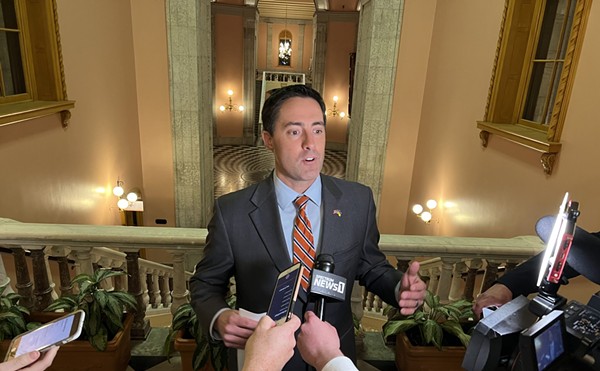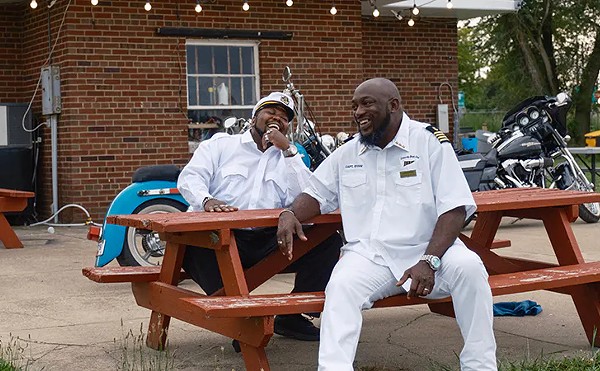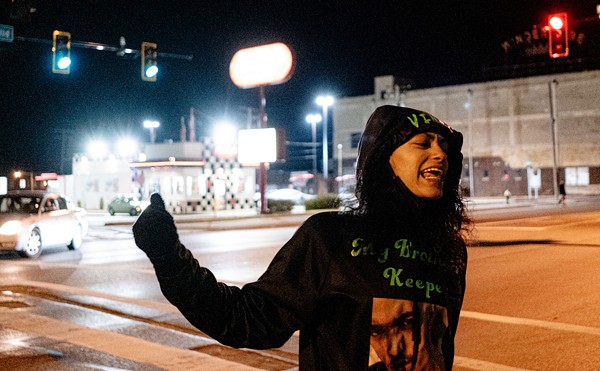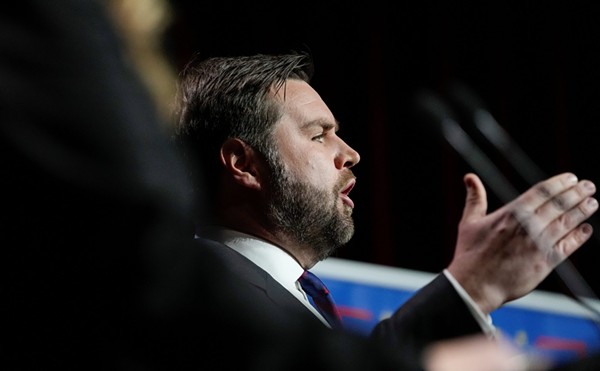Today is a big day. Riding one of his father's star thoroughbreds, Clever Jimmy C, Ricky is trying to extend his dad's winning streak. The North American record for consecutive wins by a trainer is 14. Benny, Ricky's father, is already at nine.
"It's not only unusual, it's unheard-of," says trainer Tony Rini.
And Benny's doing it in an unconventional way. Most big-time trainers race 30 or more horses. Benny only runs three. For them to remain healthy and in top racing form for so long is "very rare," says Peter Denk of the Thoroughbred Times.
In the Felicianos' case, it's in the blood. Benny was once Ohio's top jockey, racing at some of the nation's premier tracks. He's now passing that legacy onto his son, who won more high-stakes races than any Ohio jockey last year.
Benny sits anxiously, waiting for Ricky's race. It's his first of the day, and Benny thinks his son has a good chance of winning.
At the bell, Benny crouches down, legs spread apart, as if he were straddling a horse.
The horses round the first bend, blurring together like paint in a watercolor portrait. At the stretch, Ricky pulls away, confidently striking his horse.
"He's going to do it! He's going to do it!" his father screams, slapping a rolled-up program on his thigh.
Suddenly, there's a crash. A horse's leg snaps like a pencil, cleanly in two. A body falls to the ground.
It's Ricky.
Benny sprints to the track, ignoring officials' calls to stop. Ricky's shoulder is dislocated; his arm hangs like a rag doll's as he moans in pain.
Benny strokes Ricky's sweaty head as his son is moved onto a stretcher.
Later, the father finds a substitute jockey to ride Clever Jimmy C. Yet the man pushes the horse too hard, too early. Clever Jimmy C finishes second.
Worse, Benny had entered the horse in a claiming race, which allows any licensed owners to purchase a horse, provided they put in their bid 10 minutes before the start. Believing the race was Clever Jimmy C's best shot at continuing the streak, Benny took a gamble. Shortly afterward, another owner claims Clever Jimmy C.
Benny buries his face in his small, calloused hands. "In one day, I lost the race, lost my horse -- and I almost lost my son. It was not what I would call a good day."
He smiles tightly.
"But I've been through worse."
Indeed he has.
It seemed so easy in the beginning. In 1970, 18-year-old Benny kissed his mother on both cheeks and left Puerto Rico for good. His brother, Miguel, had found a house on Cleveland's West Side and a job at a local factory. He promised Benny the same.
A few weeks after the teen arrived, the brothers were at a nearby watering hole. The bar owner asked Benny whether he'd ever considered horse racing. Benny, who'd only ridden a few times, laughed. But the owner said that Thistledown needed short, young riders. At 5 foot 2, with the strong, light body of a preteen gymnast, Benny had just one question: "Does it pay well?"
It did.
When Benny first saw the size of the thoroughbreds he'd be riding, his stomach turned. Their hindquarters were taller than his head. These were nothing like the ponies in Puerto Rico. "They looked so big, and I was so small," Benny says.
But to Benny's surprise, he soon discovered he was a natural, innately understanding the horses' temperament and adjusting himself to fit their needs.
"Benny's a good judge of horses," says Rini. "He knows at all times what's underneath him."
With a sixth-grade education, he had spent most of his life feeling inferior. On top of a horse, Benny discovered his worth. He was one of the first riders at the stable every morning, trading chores for advice.
Benny soon began to smash Thistledown records, once in the mid-'70s winning six races in one day. Three times he was named the track's leading jockey.
Around the other jockeys, Benny was jovial and well-liked. But around owners -- the people who decide which jockey rides their mounts -- he turned on the charm. "Benny was real good at schmoozing people," Rini says. "He had it down to an art."
In 1975, Benny got his big break. The owners of a champion horse, Brent's Prince, didn't like their regular jockey's performance. For the Ohio Derby, the state's biggest racing event, they asked Benny to ride instead.
The favorite that day was a well-bred California horse that had been piling up wins on the West Coast. But Benny ran Brent's Prince smartly. As the two neared the finish line, Benny leaned forward and gave the horse one last kick. To the surprise of almost everyone, Benny won by a nose.
Afterward, he started competing at bigger tracks. In New York, he jockeyed for Yankees owner George Steinbrenner. The man "likes to win," says Benny. "If you ride for him and you don't win, you're out -- just like with the ballplayers."
Benny won.
By 1981, Benny was at the height of his game. At Chicago's Arlington Park, he was the eighth-ranked rider, poised to advance.
At that time, Arlington was one of the nation's premier tracks. Benny was an outsider trying to break in. Other jockeys and trainers weren't welcoming. "There's always resentment when new guys try to come into a track," explains Norm Barron, chairman of the Ohio State Racing Commission.
It didn't help that the chairman of the Illinois Racing Board didn't approve of Benny, a married man, seeing his daughter, adds Barron.
Early one morning in September, Benny pulled his car up to the jockey's kitchen, leaving the doors unlocked. He was chatting with his agent when security officers tapped him on the shoulder. There'd been a report of an illegal device in Benny's car.
Benny had no idea what they were talking about. He agreed to the search.
Benny watched as the officers turned over papers and searched in cushion cracks. Nothing. Then they opened the glove compartment. Inside, they found a battery -- a small device used to stimulate horses.
Using them is outlawed in racing, akin to a weightlifter being caught with steroids.
Benny was escorted off the premises and suspended for 60 days while the racing board investigated.
Benny swore that the device had been planted. Other jockeys agreed.
"He was a very good rider going into someone else's backyard," says former jockey Joel McCullar. "There's a lot of bad blood between the established riders and the new people. Setups were not unheard-of." He wasn't the only rider to question the circumstances around the sting.
"The fact that it was found in his car is really suspicious," says jockey Tommy Meyers. "It's easy to plant a battery there, when all the doors are open."
But despite the protestations, the evidence pointed to Benny's guilt, and it was impossible to prove the battery was planted.
He got Steinbrenner and Henry Gurvis, chairmen of Ohio's racing commission, to write letters praising his honesty. It did no good. In 1981, Illinois banned Benny for life.
At the prime of his racing life, he had lost everything.
Ocala, Florida, is known as a haven for outlaws. Acres of sun-dried fields and Sunnybrook training centers provide solace and employment to the exiled. No one looks at riders with accusatory eyes. Pasts are the past.
In 1983, Benny moved his family -- Ricky, Ricky's sister, and his wife, Millie -- to Ocala. He had no other choice. Most states have a gentlemen's agreement to respect rulings from other states, which left Benny banned from America's most prominent tracks. Florida's vast training facilities provided employment.
"Horses were the only thing I knew," he explains. "I still had to support my family some way."
In Ocala, he trained young thoroughbreds. It was dangerous work. Many of the horses were unaccustomed to having saddles loaded on their backs and bits stuck in their mouths. They fought back, biting hands and kicking stomachs. More than a few riders were injured by being thrown from the saddle.
Benny went from making $90,000 a year to $300 a week. In order to cover the bills, he had to sell their home in Cleveland.
It was during this time, when Benny despised the sport the most, that 11-year-old Ricky suddenly expressed interest.
One day, Ricky, a curious toothpick of a boy, asked his father to show him how to gallop. Benny was amazed at how quickly his son absorbed his directions. A week later, Ricky heard about a local pony competition, which attracted some of the top amateur riders in the area. Maybe if he has a bad experience, he'll quit, Benny thought. He encouraged his son to enter.
Much to Benny's dismay, Ricky came in third, placing behind two riders in their late twenties. Benny realized that his own skills had been implanted in his son.
"If he ever wanted to be a rider, I knew he was going to be a very good one," Benny says. He agreed to coach Ricky every morning.
Benny spent his spare time trying to overturn the Illinois ruling. In 1988, he applied for an exercise license, which would allow him to work out horses. The board denied his permit, but a Cook County Court saw things differently. It ordered the board to grant a license.
The family was elated, but the joy didn't last. The board appealed, and the court revoked Benny's license once again. The Illinois Supreme Court agreed.
Back at Thistledown, Allen Fairbanks, a former jockey and respected racing official in three states, made it his personal crusade to help Benny get his license back. "I've known Benny for a long time, and he is just a super horseman and a damn good rider, who didn't deserve what he was getting," he says.
In 1989, Benny applied for an Ohio jockey license. Benny arrived at the hearing with Fairbanks. Nervously, his hands shaking, he explained to the committee that fateful day surrounding the car search. Since Ohio and Illinois had reciprocity agreements to uphold each other's rulings, the commission still denied Benny the license. But the story caught Chairman Norm Barron's ear.
"The thing that concerned me from the very beginning was that the battery was found in his car," Barron says. "If a jockey is using a battery, it's usually in the jockey's room. They'll discard it when they cross the finish line or throw it in the wastebasket, not keep it in their car."
The other detail that gnawed at him was that the device had been found in an unlocked vehicle. If Benny was trying to hide the battery, why would he leave both the car and the glove compartment open? Why would he let security search his car?
Barron read newspaper stories confirming Benny's relationship with the racing commissioner's daughter. He learned that Benny had never been in any kind of trouble before.
Given the circumstances, and the fact that the battery wasn't actually found on Benny, Barron thought a lifelong ban seemed excessive.
"I thought, 'Someone needs to give Benny a second chance,'" Barron says.
Barron came up with a new ruling: The racing commission still wouldn't give Benny a jockey license, but it would grant him an exercise rider's license, which would allow him to work out horses. Once another state granted Benny a jockey license, Ohio would accept it too.
Benny turned to West Virginia, which, with its small crowds and dearth of big-time talent, was more willing to disregard Illinois' ruling. Benny raced there for two months before returning to Ohio.
In 1990, Benny returned to Thistledown for his first Cleveland race in 11 years. He was greeted with a standing ovation.
"I felt like I was home again," he says.
Benny tried hard to make up for lost time, but it was clear that, at 38, he was past his prime.
Though he won a number of races, the effort was exhausting. He wasn't at the level he was pre-Chicago. At times, he misplaced his anger, calling fouls on races he lost. He'd demand that other jockeys be disqualified for purposely bumping him. Once, after coming in fourth, he walked officials through three spots where he claimed he'd been illegally boxed in. Officials reviewed the tape and saw nothing.
"Benny always had a knack for grandstanding," says Rini. "He almost fooled the stewards enough to cause multiple disqualifications of other riders."
Meanwhile, Ricky was starting to replicate his father's championship form. Their riding styles were nearly identical. Ricky showed patience and had become a fine judge of pace. He rode smart, never burning his horse out too early.
Benny devoted himself to Ricky's development. He woke the boy at 5 a.m. to work the horses and introduce him to owners. Ricky would still be rubbing sleep out of his eyes when they arrived at the stable. "I am not a morning person," Ricky complains.
In 1997, Benny decided that Ricky was ready to compete at Thistledown. At the last minute, Benny was also asked to ride. The pair's first race together was as competitors. Benny hated it.
Ricky came in seventh, his father third.
One month later, Ricky won his first Thistledown race in dramatic style, nudging out his father for the victory.
"That was a really good feeling," says Ricky, his eyes gleaming.
The wins kept mounting, climaxing with a $100,000 victory in the Best of Ohio Endurance race the next year. In the winner's circle, with a medal around his neck, Ricky looked around the track. "This is the greatest day of my life," he said. "Where's my dad?"
Ricky continued his streak, winning back to back Best of Ohios in 2001 and 2002. Soon, owners were choosing him as their first jockey.
"With time, I think he can even be better than his father," says Fairbanks.
But Ricky wanted to be recognized on his own merits. As a joke, his cousin once attempted to tape a poster of a baby on his locker with the words "Feliciano Junior" across the top of it. Ricky threw a fit.
Around the other jockeys, Ricky became the requisite prankster. He squirted shaving cream on a jockey who won his first race and locked another guy in the steam room. Longtime employees say his dad was much more serious.
Ricky also lacked his father's diplomacy. If he didn't think a horse could win, he'd tell the trainer straight out.
"A lot of jockeys worry that if you insult their horse, you'll never ask them to ride again," says trainer Robin Schuster. "But Ricky will tell you exactly what's wrong with him."
As Ricky's career catapulted, Benny decided to change his own.
"I knew he was going to be excellent," Benny says. "If I didn't believe that, I would have kept riding."
In 1999, Benny hung up his boots and started a new life as a trainer. Benny's best qualities as a rider served him well. He instinctively knew which races his horse would excel in and which to sit out. Success came immediately: In his first race as a trainer, his horse placed first; Ricky rode it to victory.
Last year, Benny bought a weak-kneed thoroughbred, El Keko, for a mere $2,000. The seller told Benny that the horse was past his prime. El Keko earned him $60,000. Bob Roberts, The Plain Dealer's track reporter, called Benny the "hottest trainer at Thistledown and perhaps in North America."
But Benny may never get the chance to prove his greatness. He holds licenses only in West Virginia, Ohio, and Florida. Because of the ban, he doesn't want to try his luck at other states' tracks.
"As we see it, Benny is still ineligible for any licensing here," says Mickey Ezzo of the Illinois Racing Board.
Now, Benny tries to shield his son. He tells him never to leave his car doors unlocked. To trust only himself and his family. "But Ricky doesn't want to see or hear that," Benny says.
Gazing at a line of jockeys gearing up for the next race, Benny frowns. "When I think back, it seems like all this happened yesterday."
Ricky's injuries in December were bad enough to cause massive pain, but not keep him from the saddle.
In April, he was back atop two of his father's newest horses, Fabulous Honor and the Kraken. Already, Fabulous Honor's won four races, the Kraken one.
On a recent day in June, Ricky mounts the Kraken while his father watches from the viewing box. It's raining so hard it seems to be falling diagonally.
"This is exactly what I didn't want," Benny murmurs.
Lightning delays the start twice. When it finally begins, Ricky leads the pack at the half-mile, holding his whip dominatrix-style.
At the three-quarter mark, Ricky still leads. But the Kraken isn't made for slogging through mud. His hooves don't grip the ground as firmly as other horses'. At the turn, one rider passes Ricky. Then another. And another. Ricky falls to the back.
Benny slaps his program on his leg. Then he starts running down the stairs.
"Where are you going?" someone asks him.
"To cheer up my son," he says, without breaking stride.











